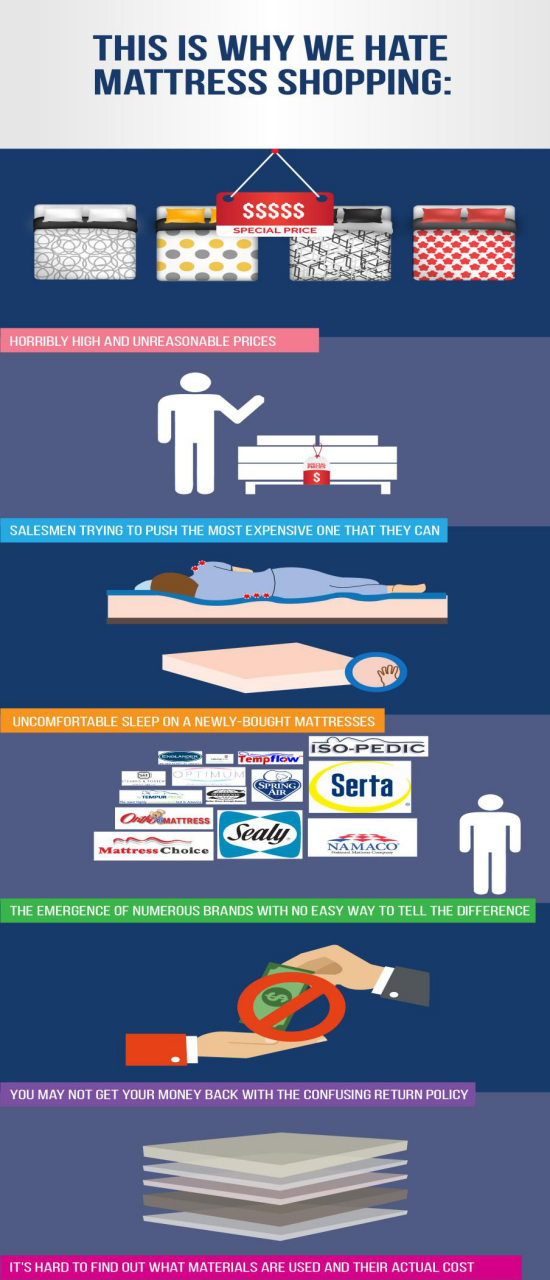
For the longest time, mattresses were at the bottom of our shopping list. You probably shop for a mattress the same way you file your tax returns: by putting off the task as long as you can.
You're not alone.
In fact, buying a mattress is ranked as one of the worst consumer shopping experiences.
Ever asked yourself why?
The mattress industry is under-regulated and full of myths
Information asymmetry in the mattress industry has created a seller's market. It has taken all control from the buyer, relegating consumers to a passive role. And putting them at a disadvantage.

Imagine such a situation:
You need to return a mattress but find that the return policy favoring the vendor.
You would feel tricked but the only thing you could do is kiss your money goodbye.
Most frustrating would be the fact that you can't live without a mattress.
So you would have to bite the bullet and buy another.
And even if you're extra careful when choosing a mattress based on a brand's reputation, odds are that all you would end up doing is picking a more reputable trickster.
no matter how much you try, you can't win.
Which makes sense given that the rules are made by your opponents.
And they can change the rules whenever they want.
What a sad, ridiculous situation!
But the consumer has had enough. People are looking for an insightful voice to guide them on how to shop for a mattress. Truthful information about the mattress industry is like a lighthouse. It illuminates dark seaways and dispels the haze on a misty night. The mattress market is ripe for a new order where shady vendors are replaced by sellers offering good products and services. If such a change were to happen, then the price of a mattress would reflect its actual value. We need a healthier market environment in which consumers enjoy convenient service and get value for their money.
Before that, let’s reveal the myths of mattress industry.
Myth 1: “Our mattress is perfect for all”
 All sellers claim that their product is perfect for every consumer. If that were true, we would only need a few brands to meet everyone's needs. The reality is that every year, more brands continue to enter the mattress market, which proves that the idea that one mattress can please everyone is a lie. Having many brands to choose from helps to reduce monopoly in the market. On the other hand, the wide array of brands makes it harder for consumers to decide which brand of mattress to pick.
All sellers claim that their product is perfect for every consumer. If that were true, we would only need a few brands to meet everyone's needs. The reality is that every year, more brands continue to enter the mattress market, which proves that the idea that one mattress can please everyone is a lie. Having many brands to choose from helps to reduce monopoly in the market. On the other hand, the wide array of brands makes it harder for consumers to decide which brand of mattress to pick.
Myth 2: “Mattress reviews can always help me”
That's where mattress review sites come in. They try to describe a particular mattress using a list of aspects, such as firmness, air circulation, support, price, warranty and trial period. Review sites try to give honest, unbiased information. However, the downside of such sites is that they detail the experience of only one or two people. Shoppers tend to believe a product review that has the contribution of many people. For this reason, reviews done by one or two persons are not enough to inform a buyer's decision.
You may think reviews from many customers can help you pick a mattress?
How about Amazon or Ebay?
They may have thousands of customer reviews, but that doesn't mean that you should depend on them.
You know what?
Some dishonest sellers often trade discounted or free mattresses for good reviews!
That's why it takes a lot of time to read those reviews, and life is too short to spend all your time seated at the computer.
Worse still, with so much conflicting information, the more you read, the more confused you become.
Reviews don't always help, so just test it!
 When all is said and done, each person's experience of a mattress is unique. It depends on the individual's body type, sleeping position and personal preference. That's why testing a mattress is the surest way of knowing if it's the right fit. But testing a mattress is not so easy as expected. When shopping offline, your experience of a mattress in a bedding store is different from that in your own home. When shopping online, the testing can be both costly and risky.
When all is said and done, each person's experience of a mattress is unique. It depends on the individual's body type, sleeping position and personal preference. That's why testing a mattress is the surest way of knowing if it's the right fit. But testing a mattress is not so easy as expected. When shopping offline, your experience of a mattress in a bedding store is different from that in your own home. When shopping online, the testing can be both costly and risky.
I'll show you the cause below:
Myth 3: “You get 100% refund if you don’t like the mattress”
Sounds great? But return policies can’t guarantee you money back sometimes.
For an average U.S family, the allocated budget for a decent mattress is about $1,000.
Suppose the family finds that the mattress they bought is uncomfortable.
A bad return policy can prevent the family from getting a refund. Naturally, the family will become frustrated and angry. They may vow to never buy another mattress. Besides, they will have to suffer the double loss of losing their money and putting up with the discomfort of their new, expensive, awful mattress.
Myth 4: “A payment plan makes your shopping easier”
Instead, it may only make things worse.
Some vendors offer financing solutions that allows you to pay off the mattress over time. Payment plans may be a convenient way to pay for the mattress but they are no substitute for a good return policy. Suppose you choose to pay for your mattress through a payment plan. If the mattress turns out to be unsuitable and the return policy turns out to be unfavorable, then you would be stuck. You would have to pay money every month for a mattress you hate. Such a situation would have the holiest of saints frothing at the mouth, screaming bloody murder!
But don’t lose hope.
Buying a mattress can be simple
 While the process is best described as a risky adventure, a good return policy can minimize that risk. Any methods that can help narrow your search can save you lots of time and effort. Review sites offer pretty comprehensive guides and so do I. But mine is much more actionable.
While the process is best described as a risky adventure, a good return policy can minimize that risk. Any methods that can help narrow your search can save you lots of time and effort. Review sites offer pretty comprehensive guides and so do I. But mine is much more actionable.
Check out the post: ‘How to Buy a Mattress In 3 Steps? - Get The Ultimate Proven Guide’. Whenever you need a new mattress, read the ultimate guide in the time it takes to drink a cup of coffee.
1. How return policies work
Normally, it contains two parts: sleep trial and warranty
Now let's talk about the former.
Different brands offer sleep trials of varying duration.
Sleep trials can be 90, 100 or 180 days long.
The trial period allows you to find out if the mattress you picked is right for you.
For example:
If, during the 100-night sleep trial, you find that the mattress doesn't suit you, you can ask for a refund which you can use to buy another mattress.
About how it works?
There are two types of sleep trials.
1.1 Sleep trial version 1
I would rather call it in this way:
Myth 5: “You body will get used to our mattress in 30 days if you don’t like it on your first try.”
In the first version, you would have to wait 30 days before asking for a refund.
Why waiting that long?
The logic behind this rule is that 30 days is the time it would take for you to get used to the mattress.
Why the fuck would anyone agree to suffer for an entire month!?
Chances are if you don't like the mattress on day 1, you won't like on day 30.
In normal cases, after a mattress expands fully, its feel doesn't change.
You need to change that mattress as soon as possible.
Can you imagine tolerating an unsuitable mattress for 30 days? Every day of fitful sleep, bad moods and fatigue?
I'd rather not. Would you?
1.2 Sleep trial version 2
That's why I prefer another kind of return policy.
The kind where you can return the mattress at any point during the trial period.
If the mattress is not for you, there's no need to wait 30 days before asking for a refund.
As soon as you decide to return the mattress, you can contact the mattress seller for a full refund.
The seller will retrieve the mattress from you and will decide whether to donate it or resell it.
Myth 6: “We don’t sell returned mattresses”
Not all brands can promise you that.
How can you make sure the mattress you bought at full price hadn’t been used by another person?
Keep reading:
Ideally, every consumer should get a mattress that has never been used.
But if sellers donate every returned mattresses, it affects their bottom lines.
Profit, of course!
Here is their dilemma for both parties:
A policy that favors the seller may be exploitative to the buyer who pays for a brand new mattress only to get a pre-owned one. A policy that favors the buyer requires the vendor to assume the cost of returns. This eats into the vendor's profits. So many sellers have to raise mattress price to recoup the loss of potential returns. So whether a mattress is resold or donated, the buyer will foot the bill in one way or another. For more details, Check out the post ‘Pre-Owned Mattresses At Full Price? - The Hidden Truths Of Returned Mattresses’. There you'll find if you are buying a new mattress or a pre-owned one.
Check there!
3. Mattress Warranty Information
Most mattresses come with a 10 year warranty but some luxury brands give 20 year warranties.
You should know that the price of the mattress has the cost of warranty factored into it.
Because warranty is actually an insurance that guarantees you are getting value for your money.
In other words:
You are paying extra for a mattress that will last rather than risk buying a mattress that falls apart soon after the trial period.
3.1 Who offers the better warranty? Physical stores vs online sellers
You may can’t help asking yourself:
“What if the seller deny their mattress warranty claim?”
So you need to carefully go through the warranty offered by a physical store to avoid falling prey to any tricks the sellers may have up their sleeves. If you fail to spot the seller's treachery, you could eventually suffer a loss that will haunt you. In contrast, online vendors have customer-friendly warranty that is easy to understand. In order to boost consumer confidence, online vendors need to be diligent, honest and considerate. Online vendors have to be on their best behavior since they are constantly trying to grow their market share. Currently, online mattress only take 5% of mattress industry sale. (data provided by the industry analysis of Tempur, Sealy and Saatva in 2017). Brick and mortar stores are larger in terms of market share, profits, brand recognition and presence. Maybe that's because they have branches in almost every town and their brand names have been around for generations. These stores seem very strong but they'll lose their advantage in market share. Because online sellers are more motivated to provide better products and services with lower price. Still, online vendors have their weak points, which I'll explain in another post. Also, if you are still having difficulty in deciding to buy mattresses online or in a mattress store, check the post below:Buying a Mattress Online Vs In Store - 8 Tips That You Need To Know
Myth 7: “The 10-year warranty can get you value for your money”
 Online sellers have short warranties that are only a few paragraphs long. They have phrases like:
Online sellers have short warranties that are only a few paragraphs long. They have phrases like:
“In ten years, if you find any manufacture defects on your mattress (for example 1 inch sinkage), we promise to replace or repair it.” Though it sounds nice, the phrase is a little vague. Let's take a closer look at it. For starters, the seemingly simple warranty has some hidden tricks.
Ask yourself, what qualifies as a manufacture defect?
A broken sewing line?
A sinking or deformed mattress?
Many consumers complain that though sinking in a mattress is less than 1 inch, it still causes back pain. But less than 1 inch sinkage is not covered by most mattress warranties. That means the consumer cannot claim a refund. What should we do to avoid those troublesome issues above? My advice is that we directly ask customer service about any questions of warranty by email. Place an order only when they agree to take care of whatever mattress problems that cause you discomfort.
What consumers want from sellers
Consumers should never be disregarded or treated as fools. Maybe they are not always able to articulate their needs. However, they clearly know what they want and what they don't want. I researched tens of thousands of web posts and comments for consumer complaints and here are what I found.
They want a seller that:
provides them truthful information about their mattresses. offers a quality mattress with an honest price that reflects its true value. guarantees them a 100% refund for whatever reason that causes them discomfort. Those are also what I, as a mattress seller, aim at! Maybe my solutions to the issues detailed in this article are not perfect. But a least they might inspire some great minds to come up with great ideas that can be shared on this space.
Welcome to Share!